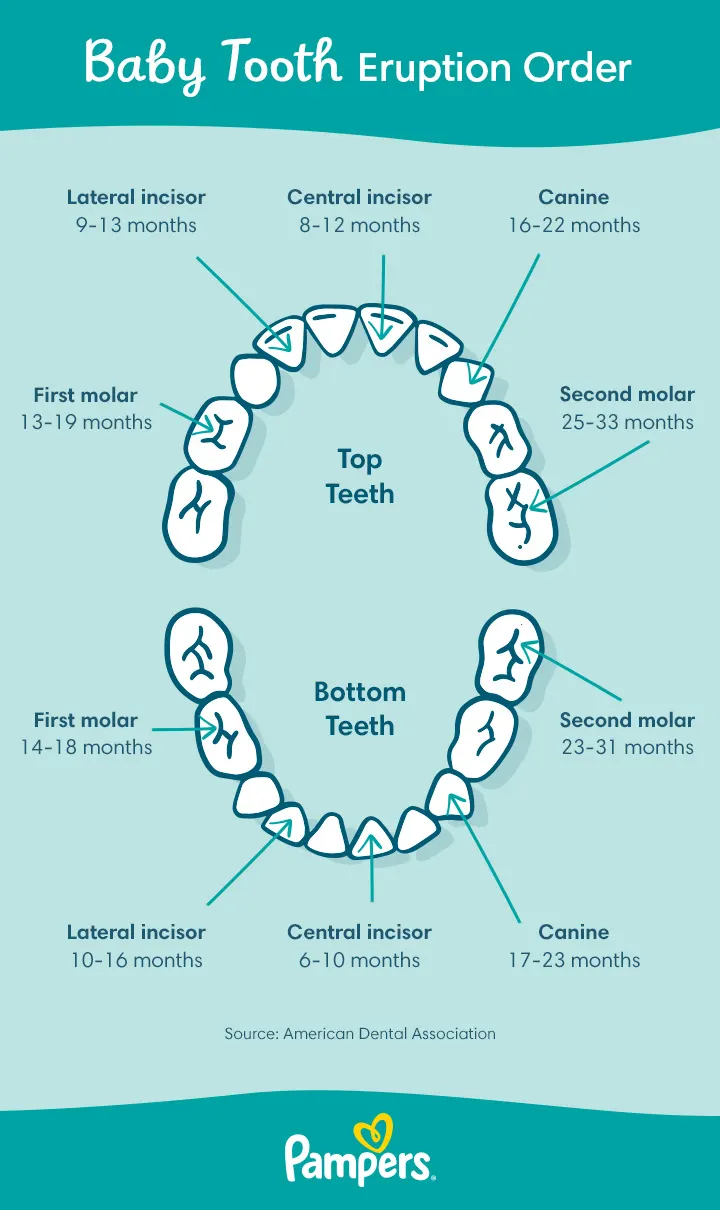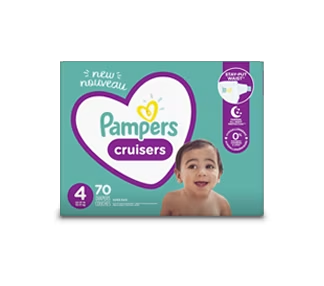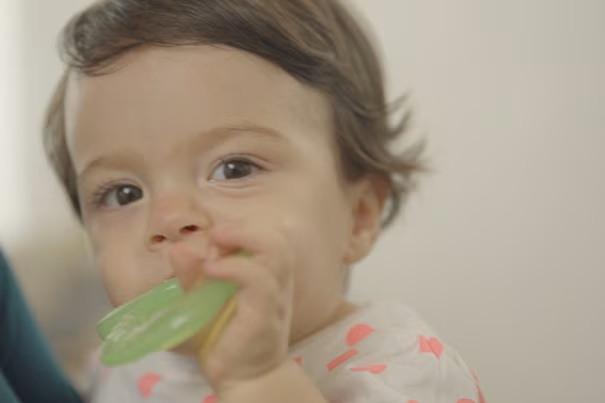Baby Teeth Chart and the Order of Tooth Eruption
An exciting milestone you might be looking forward to is teething, especially when your little one’s first tiny tooth starts to show. A baby teeth chart is a helpful guide to tooth eruption and answering questions like, when do molars come in, how many teeth do kids have, and when do kids lose their first tooth? Keep reading for a teething timeline and discover in what order baby teeth come in and when do they fall out. Before you know it, you’ll be enjoying lots of toothy grins!
Baby Teeth Chart
A baby teeth chart shows you when each of your little one’s first set of teeth—known as primary teeth, baby teeth, or deciduous teeth—is likely to come in and then fall out. In a way, it acts as a baby teething timeline but in chart form.
Although the exact age when a tooth erupts or falls out will vary from child to child, the baby teeth chart below is a rough guide to when babies typically get their teeth.
In What Order Do Baby Teeth Come In?
Baby teething works in stages, usually beginning around the ages of 6 to 12 months, although for some babies, a tooth can appear as early as 4 months or later than 12 months.
Most of the time, you can think of a baby teeth schedule like so:
The two front teeth—the central incisors—on either the top or bottom row
The other row of front teeth
The first molars
Canines.
Teeth usually fill in, often in pairs, with one on each side of the upper or lower jaw, until all teeth have arrived. Usually by the time your child is 2 1/2 to 3 years old, all of the primary teeth will have erupted.
The table below shows an approximate age range for a baby teeth growth chart, as in when each tooth will come in. Of course, this also acts as a toddler teeth chart and a kids’ teeth chart as your little baby gets older.
| Top teeth | When the tooth comes in |
|---|---|
| Central incisor | 8 to 12 months |
| Lateral incisor | 9 to 13 months |
| First molar | 13 to 19 months |
| Canine | 16 to 22 months |
| Second molar | 25 to 33 months |
| Bottom teeth | When the tooth comes in |
|---|---|
| Central incisor | 6 to 10 months |
| Lateral incisor | 10 to 16 months |
| First molar | 14 to 18 months |
| Canine | 17 to 23 months |
| Second molar | 23 to 31 months |
Using these teething charts, you can answer several common questions that parents tend to ask. For example, when do toddlers get molars? Using the chart above, you can see that toddlers tend to get their first molars from 13 to 19 months, both the top and bottom rows.
How Many Teeth Do Kids Have?
In total, 20 baby teeth come through. There are 10 on the upper jaw (top teeth) and 10 on the lower jaw (bottom teeth).
Your little one’s mouth will gradually become filled with these teeth up until the age of 3. Then, these primary teeth will begin falling out around the age of 6 to make way for your child’s adult teeth.
Can Teething Be Painful for Babies or Toddlers?
For some babies, teething is painless, but for others it may occasionally cause mild irritability, crying, and even a low-grade temperature.
Much of the discomfort comes from the gums around the new teeth as they erupt, which can become swollen and tender. A common question that many parents ask is, which baby teeth hurt the most coming in? The symptoms are the same for every tooth that erupts, so the one that hurts the most will vary from child to child, or they all may cause the same amount of discomfort.
If your baby or toddler is showing signs of teething causing discomfort, contact your child’s healthcare provider or dentist for personalized advice. Watch the video below to learn four ways you can help soothe your teething baby:
When Do Kids Lose Teeth?
The first primary teeth begin to fall out when a child is around 6 or 7 years old. This is why it’s important to consider all this information in teething stages, as the full process takes years. The teeth chart from above works for an infant, baby, toddler, and kids.
The table below works, in a way, as a tooth loss chart and offers an approximate age rage for when each tooth typically falls out. Keep in mind, this table shows an average range, and it may happen a little differently for your child.
| Top teeth | When the tooth falls out |
|---|---|
| Central incisor | 6 to 7 years |
| Lateral incisor | 8 to 9 years |
| First molar | 9 to 11 years |
| Canine | 10 to 12 years |
| Second molar | 10 to 12 years |
| Bottom teeth | When the tooth falls out |
|---|---|
| Central incisor | 6 to 7 years |
| Lateral incisor | 8 to 9 years |
| First molar | 9 to 11 years |
| Canine | 9 to 12 years |
| Second molar | 10 to 12 years |
FAQS AT A GLANCE
Most of the time, baby teeth will appear in the following order:
- Central incisors
- Lateral incisors
- First molars
- Canines
- Second molars.
The Bottom Line
It’s exciting seeing that first baby tooth, and a baby teeth chart can provide a rough idea of when the rest of your baby’s teeth will come in. Just remember that every child’s development is different, so your little one’s teeth may follow a slightly different timeline.
At this time, you might also be interested in reading up on dental care for children and how to brush your baby’s teeth.
How We Wrote This Article The information in this article is based on the expert advice found in trusted medical and government sources, such as the American Academy of Pediatrics and the American College of Obstetricians and Gynecologists. You can find a full list of sources used for this article below. The content on this page should not replace professional medical advice. Always consult medical professionals for full diagnosis and treatment.
Join Pampers Club and get:






